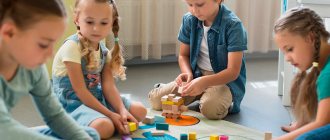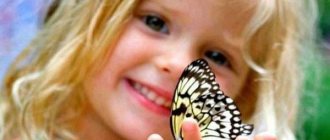It is especially difficult for young children to get used to the conditions of a preschool institution.
They are still too attached to their mother and are afraid of everything new and unfamiliar. Every child, when visiting a kindergarten, experiences difficulties during adaptation - the body’s getting used to life experiences that are different from early ones.
From the first days of life at home, the child is instilled with special rules - a certain sleep and wakefulness schedule, types of activities, nutrition, the nature of relationships with others, prohibitions, etc.
During adaptation to the nursery, the child’s behavior and reactions change - the baby cries a lot and gets irritated, eats less and less often, sleeps poorly, loses already acquired skills, and often gets sick. However, such symptoms are a natural reaction to new living conditions.
The nursery is an unknown space, new faces, a hierarchy of relationships. The adaptation process requires a lot of mental energy and physical strength. Features of addiction depend on the individual and personal qualities of the child.
To facilitate this process and reduce the impact of traumatic factors, it is important to prepare the child for changes in advance, and provide comprehensive assistance and support throughout the entire period of adaptation.
How is the period going?
Adaptation of children to nurseries goes through several periods, characterized by the severity of certain negative reactions.
Acute phase .
At the first stage, maximum mobilization of the child’s body is observed. The baby is constantly in an excited, tense state. He is whiny, nervous, capricious, hysterical both within the walls of a preschool educational institution and at home.In addition, physiological changes related to heart rate or blood pressure can be observed. At this stage, susceptibility to all kinds of infections and viruses increases.
- Moderately acute phase . The severity of negative manifestations noticeably decreases, the baby gradually adapts to the changed living conditions. There is a decrease in excitability, nervousness, improved appetite and sleep. However, at any stage of this phase, a resumption of negative emotions is likely - hysterics, tearfulness, reluctance to part with parents.
- Compensated phase . Characterized by stabilization of the mental state. The child successfully finds ways to interact with the teacher and peers and actively begins to learn new skills.
Adaptation cannot be avoided - it is the body’s natural reaction to changed conditions. Some children successfully cope with stress in a few weeks, while others remain in emotional stress for several months.
Difficulties
Adaptation to new living conditions at an early age is complicated by age-related developmental characteristics . Children have not yet fully developed the mobility of nervous processes - they are less mobile, it is difficult to distract them or interest them in a new toy.
Not all children have time to master the methods of verbal interaction - therefore, they do not always correctly perceive the speech of an adult addressed to them. Kids cannot boast of experience communicating with different people; it can be extremely difficult to calm them down.
Features of development of young children from 1 to 2 years old
In the period from 1 to 2 years, the developmental features of young children are as follows: the child begins to form important and complex brain functions, his behavior begins to take shape and his character begins to take shape. He begins to walk without support, which gives him the opportunity to explore the world around him more and more, and also gives him the opportunity to directly communicate with other children.
This is the age at which many social traits are formed, such as empathy and love for loved ones.
The growing interest in knowledge intensifies, and, given the increase in the child’s waking period, gives him more opportunities and endurance to devote himself to studying the subject that interests him.
Undoubtedly, the important fact is that a child under the age of two begins to improve speech and understand more words by imitating adults. For example, the first simple word forms and definitions appear: a cow is “moo-moo”, a dog is “woof-woof”, etc. Gradually, the child begins to imitate the phrases and intonations of adults and begins to increase his vocabulary.
Also during this period, the child begins to listen to his inner feelings and learn to distinguish between his moods and feelings.
The developmental features of young children in the period described above require the implementation of the following recommendations:
- It is necessary to use games during which the child can develop speech and communication skills - this is a very important process in the development of children of this age. During the game, you need to use simple and understandable speech, ask him to repeat the words after you and explain the meaning of the words he said.
- Offer your child the choice “Will you have a pear or an apple?” You should not rush him to answer - he must choose for himself.
- It is also important to play games that develop motor skills, such as blocks and pyramids.
- Draw with your baby and teach him to distinguish colors.
- Talk to him, but do not complicate your speech with terms he does not understand. You should ask questions “How do you feel?”, “Are you interested?”, “Are you feeling good?” to teach him to distinguish between his sensations. Do not prevent your baby from moving objects and furniture.
- Also, in a playful way, you can help clean up the house and do household chores with him.
- Teach him to recognize facial expressions; this can also be easily done using games.
- Explain to your child the meaning of the word “no” and its reasons.
What schemes exist?
Practice has made it possible to develop certain schemes for including children in the nursery group. Each parent must decide on the appropriate option, based on the personal characteristics of their baby.
Preliminary preparation
Many parents begin to live according to the kindergarten regime long before the first day of their stay:
- early rise;
- similar menu;
- lunchtime nap;
- familiarization with different types of activities;
- organizing interaction with peers (for example, on the playground);
- leaving the child with other relatives or close friends.
The advantage of this approach is that the child gradually gets used to the alternative reality in advance. He understands that home and mother, familiar toys are not the only thing in this world. The baby readily begins to show cognitive interest in an unobtrusive environment .
The disadvantage of this adaptation scheme is expressed in the confusion of concepts - the baby will not see the difference between being at home and in a nursery if he begins to live according to a 24-hour schedule. Psychophysical relaxation after visiting kindergarten is also important and necessary.
Visiting mode
Some parents prefer to introduce their baby to a new environment gradually - going a couple of times a week for several hours . On the one hand, the child will feel comfortable this way, on the other hand, there will be capriciousness, unwillingness to follow the rules, regime, and any requirements that contradict their own wishes.
Other adults prefer to place the child in a nursery for the whole day and take him to preschool systematically, without absences or absenteeism for a good reason.
Of course, such actions will shorten the adaptation period, but they can also cause irreparable harm to the child’s mental health.
Escort
Some parents prefer to be nearby. Thus, children, seeing the presence of an adult in close proximity, certainly experience being in a new territory more easily. However , this does not exclude the aggravation of the situation when joint attendance at kindergarten naturally stops.
When choosing a particular behavior strategy, you should rely on the individual characteristics of the baby. If a child is energetic and active, explores the world around him with enthusiasm, and has experience communicating with peers, there is no need for overprotection.
If the baby is reserved, avoids everything new, and is overly attached to the mother, then the adaptation process should be approached with understanding and everything should be done to make the baby as comfortable and calm as possible.
How to behave as an adult?
Both the teacher and the parent can contribute to a favorable adaptation to the nursery. Appropriate help and support can alleviate the psycho-emotional state of the child.
The main task of the parent is to prepare the baby in advance for visiting the nursery.
You cannot place a child in an unfamiliar environment just like that, without prior preparation.
- It is advisable to start the stay in a preschool institution with several hours and subsequently increase this time gradually.
- Parents are advised to teach their child all the rules of personal hygiene at home. This will make it easier for him to get used to the teacher’s requirements.
- It is advisable to develop a certain diet, give up snacks, and also instill skills in using cutlery. It is important to explain to the child that he needs to eat the whole portion - otherwise he simply will not have enough energy, and he will not be able to explain the physical discomfort he experiences.
- Daytime naps are an integral part of preparing to attend kindergarten, and you will also have to get used to this. Children sleep in nurseries because their leisure time is dynamic, rich, and varied. If a child refuses to nap at home during the day, you should take a more responsible approach to organizing your free time.
- Clothes and shoes should be comfortable and practical. The baby should not be afraid to get it dirty or wrinkled. Movements should not be constrained, and if necessary, the child should be able to take care of himself independently - it is advisable to abandon complex lacing, fasteners, and fastenings.
- You should be allowed to take with you to the nursery only those toys that he is ready to share and that he does not mind spoiling or losing.
We must not forget that deception, even due to a sharp change in circumstances, can become a very difficult truth for a child, shake his trust in his parent and negate all efforts to successfully adapt to the kindergarten.
The teacher also plays an important role in the child’s adaptation process. The quality of interaction with the baby and with the parents affects how the whole process will go overall and how quickly it will end.
In order for the adaptation to be painless, the teacher, first of all, needs to establish contact with the parents and agree that they bring the children at intervals of 10 minutes. This will allow you to meet each child and find a common language with him, making the process of parting with the parent easier.
It is important to establish trusting relationships with children so that they feel safe:
- show affection, kindness, interest;
- offer help;
- smile more often;
- tactile contact;
- involvement in group games;
- inquire about your mood and well-being.
The interior of the room should be cozy - decorative items, corners for privacy, a clean, soft carpet, a variety of toys.
Features of development of young children from birth
In the period from birth to 3 years, the most pronounced features of the development of young children are expressed in the following: the child’s mobility rapidly increases, he begins to crawl and move around space, exploring everything that comes in his way. Sensory skills develop - the child interacts with objects: turns them over, throws them, knocks them over, tries to feel and taste everything. Interest in books also appears, but for now simply as objects, and not as a source of information: the child carefully looks at the pictures and turns the pages. Memory formation is observed. The child understands and remembers more and more words and responds to requests. At this early age, children do not like to be left alone; they are drawn to the opportunity to establish contact with an object that responds to it with interaction.
At this age, it is very important to give the child a feeling of care and warmth.
It is important to teach a child to understand and sense the world around him, since the full development of a child largely depends on the adults raising him. You need to talk to him as much as possible. It is advisable to keep this simple but clear. Show pictures and ask questions about what is shown on them. Also using the questions “Where?”, “What?” It is important to teach a child to distinguish between the objects around him; you can start with a simple everyday environment: a chair, a bed, a lamp, a book, etc.
It is especially important during this period to explain to the child what could be dangerous for him, and, of course, it is advisable to hide all objects that could harm him so that he can move freely and safely around the space. Teach him to communicate with other people and, of course, do not leave the child alone unattended.
Mistakes of parents and educators
The main mistake parents make when moving to a preschool is trying to influence the child without paying attention to the obvious demonstration of negative reactions.
Many children are literally brought to the kindergarten by force - in tears and hysterics. For a child, such circumstances become psychologically traumatic.
Most parents are seriously busy with work, but this is not a reason to show disinterest, not communicate with the child on the way home, or not ask about the day spent in the garden.
Kids want and need:
- share emotions;
- experience;
- receive approval from others.
The teacher must find an individual approach to each child, because subsequently the teacher becomes a second mother for the children, a significant adult to whom they can always turn for help.
If a child is aloof and uninitiative all day, it is important to give him special attention. The fundamentally important task of any teacher is to tirelessly monitor the behavior, mood, and well-being of each child.
A negligent attitude towards their physical or mental health can provoke the development of serious disorders.
Do we even need a nursery?
Each parent has the right to independently decide when to take their child to kindergarten and whether to do it in principle.
Early adaptation is much more difficult; failure to understand the seriousness of what is happening can lead to all sorts of negative consequences .
On the other hand, early attendance at kindergarten, if all recommendations are strictly followed, will help ease the further transition to school and make the child more independent. In kindergarten, all conditions are created for full, comprehensive development, similar indicators of which are difficult to achieve at home.
Young children naturally cause particular concern among parents, so many of them simply refuse to attend nurseries in order to maintain mental well-being.
If at least one of the parents has the opportunity to pay attention to the child at home - organize useful leisure time, instill self-care skills, engage in training and education, provide conditions for the child to interact with peers, refusal from the nursery may be justified.
In all other cases, visiting kindergarten is a useful, vital experience that every child needs.
MAGAZINE Preschooler.RF
Article on the topic: “Development and education of young children in preschool educational institutions according to the requirements of the Federal State Educational Standard”Sharenko Vera Alexandrovna. MBDOU "Kindergarten "Varenka" , Abakan city, teacher.
Early childhood is a special time for the development of children's bodies. Almost all mechanisms in the cerebral cortex do not depend on heredity, but develop directly as a result of the body’s contact with the surrounding reality. This happens especially noticeably in the first three years of life, so it is important to lay the prerequisites for the healthy development of the child in a timely manner.
Professor N.A. Aksarina, being the founder of a nursery, in our country for the first time formed a complex of characteristics of the development of children in early childhood. She argued that the child's body develops at a rapid pace. In no other time period of childhood can such a rapid increase in the mass and length of the child’s body and the development of all brain functions be observed. The rapid pace of formation of a child’s body has its own characteristics. Directly, first of all, this is a spasmodic development. Critical moments in human development - 1 year, 2 years, 3 years, 6-7 years, 12-13 years. It is during these time periods that dramatic changes occur in the formation of new qualities in child development: 1 year is the time of mastering walking; 2 years - the formation of visually effective thinking, a turning point in the development of speech skills; 3 years is a period of clear connection between the child’s behavior and development and the second signaling system, the formation of personal development; 6 - 7 years - the period of maturity for schooling; 12-13 years – puberty, development of gender characteristics of this age. [2; 165].
Spasmodicity reflects the natural, reasonable course of a child’s development. If there are no developmental leaps, then this is a sign of defects in the baby’s development. Consequently, it is very important, while the child is enriching the experience of existence in society, to create effective conditions for the timely formation of a new quality in the development of various functions. It is very important to understand that critical periods involve the child overcoming enormous difficulties and can go in parallel with a decrease in the performance of children and other disorders of the functions of the child’s body. Good care that spares the child’s nervous system, care, and attention help him overcome all the difficulties of this period.
The pace of a child’s development depends on the rapid establishment of connections with the outside world and the slow consolidation of reactions. The skills and abilities of young children are characterized by an unstable and incomplete nature. In this regard, in teaching children it is necessary to use repetition of the material covered, to ensure a connection between the child’s independent work and the adults around him.
Spasmodic development of a young child depends on the maturation of many functions within a certain time frame. N.M. Shchelovanov and N.M. Aksarina, observing this pattern, identified the leading lines in the development of the child, based on the periods in which the baby’s special sensitivity to certain types of influences can be traced. They noted that when raising children, special attention should be paid to the formation of those reactions that mature again or directly for the first time and which cannot be formed independently, without any purposeful actions of an adult. For example, the “revival complex” , which is inherent in a baby at 3 months, the ability to use simple sentences in a conversation with an adult at 2 years, the appearance of role-playing games at 3 years.
Due to the rapid pace of development of the body, a child under 3 years of age is characterized by great vulnerability and lability of his internal state. At this age, the baby is susceptible to frequent and sudden illnesses, his emotional state changes dramatically, he gets tired easily, and his nervous system is unstable.
The foundation in teaching young children is the development of a number of abilities: imitation, reproduction, observation skills and the ability to listen, compare, analyze, distinguish, contrast, synthesize life experience.
Another feature of early age is the interdependence of the health, physical and neuropsychic state of children. A strong, physically healthy child is much less susceptible to illness and develops better mentally. But we should not forget that even minor disturbances in the baby’s well-being have a negative impact on his emotional sphere and behavior.
Every healthy child in the first three years of his existence has a high degree of indicative reactions to everything around him. This age-related feature directly activates the needs for sensorimotor development. Science has proven that if children are limited in enriching information and processing it, then in accordance with their age capabilities, the pace of their development slows down. Sensory needs are the basis for the baby’s high motor activity, and movement is a natural, conditioned state of the child, which is responsible for the development of his intellect and personal development in the future.
A special place in early childhood is given to the child’s emotions, which directly arise during routine moments - feeding, keeping the child awake, and shaping behavior. Emotions ensure the comprehensive development of a child’s personality. Positive emotions that arise when interacting and communicating with adults and peers are the key to the formation of a fully developed child’s personality.
The leading role in the development of a young child belongs to an adult. Its function is to provide all the conditions that are necessary for the development of a positive state of health for the child. When communicating with a child, an adult gives warmth, affection, and provides the volume and content of information that will be useful for the development of the child’s mind and inner state of soul. A friendly attitude, calmness, understanding, and sympathy are the key to a balanced state of the baby.
In the upbringing of young children, the unity of influence of all participants in the educational process should prevail: teachers, parents and other close family members. This is one of the conditions that ensures the child’s full, all-round development and well-being. In a family, a child is often given attention and raised by several people: mother, father, grandmother, grandfather and other adults - and their actions are not always coordinated or inconsistent in their demands on the child. Consequently, in these cases, the baby cannot orient himself in the correctness of his behavior and does not understand how exactly to behave in various situations. Some children do not obey the demands and requests of an adult, others, stronger ones, try to adapt to the situation that has arisen, each time changing their opinion and behavior, which is the most difficult task for them. A child, trying to please each side, causes great harm to his mental health. That is why adults themselves often become the cause of a child’s unbalanced, aggressive behavior. Therefore, it is important to know and understand that the requirements must be consistent and equally feasible for the baby. [5; 112].
When a teacher admits a child to kindergarten for the first time, he should know as much information as possible about him. Frequent conversations with parents and doctors add to the general understanding of the child; the teacher has the opportunity to more correctly organize interaction with each of the students, which has a positive effect on the development of each of them. You should not sharply adjust the baby’s habits, because everything should happen harmoniously, gradually, the teacher should show maximum patience with each of his pupils.
Young children are incredibly suggestible and easy to manipulate. Directly when communicating, they convey the mood of the people around them. An increased, sudden, irritable tone, sudden transitions from affection to rudeness, shouting negatively affect the baby’s behavior.
You should use prohibitions when raising children very carefully and meaningfully. After all, frequent prohibitions, as well as frequent permission to do whatever you want, are harmful to the extreme. In one case, children always restrain themselves, in the other, they do not develop the skills necessary for life. Prohibitions must be justified, demands must be made in a balanced, friendly, calm voice. The requirements must be feasible for the child to fulfill.
Independence is formed in children from early childhood. A child’s performance of actions without the help of an adult gives him special pleasure very early on. Having barely learned to speak, the child often uses the following statement in his speech: “I myself . This baby’s need for activity, independence, and self-affirmation should be supported by any means. Let the child try to perform the actions independently. This is one of the conditions for the successful development of skills and good mood of the baby. [1; 9].
Very often, the cause of restless behavior in children is disruption of his activities, intrusion into his comfort zone. A child at an early age is not able to abruptly, voluntarily finish one type of activity and immediately begin to engage in another type; the requirement to immediately stop the activity and do something else is beyond his strength, causing him to be sharply indignant and protest against the adult.
During the educational process, it is necessary to take into account the individual characteristics of each child. All children have a different type of nervous system and, therefore, the limit of their working capacity is not the same: some of them are very hardy, while others get tired very quickly.
Children's behavior is also influenced by the organization of the child's activities. If this activity is organized incorrectly, it often becomes the cause of inappropriate behavior of the child. Dissatisfaction and lack of physical activity lead to a lack of impressions and life experience in communicating with adults and peers. Therefore, strict adherence to the baby’s daily routine is the key to developing adequate child behavior.
Taking into account the characteristics of the early childhood period, a number of tasks and means of raising a child as a full-fledged, comprehensively developed personality are identified.
Objectives in physical education: protection and promotion of children's health; full physical and mental development; instilling and consolidating cultural and hygienic skills. Basic means of education: intensification of hardening activities; wide and frequent use of air, sun and of course water; rational nutrition taking into account regime moments, general massage, gymnastics; compliance with the baby's daily routine; ensuring sufficient movement of the child.
Objectives of mental education: development of actions with surrounding objects; sensorimotor development; baby's speech development; development of games and other activities; formation of basic mental processes (attention, memory, imagination, etc.); development of mental abilities and consolidation of skills in practice; formation of needs in the cognitive sphere. The main means of education: business and partnership communication between an adult and a child during his independent activities and games; creating a social development situation through various types of activities; consolidation of skills in the child’s independent activities in everyday life, in games, in communication.
The objectives of moral education include the following: the formation of a respectful, friendly relationship with adults; nurturing positive personality traits; fostering positive interactions with friends; education and consolidation of positive habits; training in basic prerequisites for work. Means of moral education: patterns of adult behavior; approval of good deeds, encouragement, praise.
Objectives of aesthetic education: developing the skills to see beauty in the surrounding world, nature, people; development of creative abilities and talent. The tasks of education are solved in different ways and means: through contact with nature, music, when teaching aspects of singing, modeling, drawing, reading folk tales and stories.
All of the above tasks are solved directly through the joint efforts of the preschool institution and the child’s family. Many parents show a high interest in pedagogical knowledge, realizing that ignorance of the principles of education, the characteristics of the morphological maturation of the child’s body and the state of his health can lead to an erroneous interpretation of methods in pedagogy, to the emergence of any non-existent, unreasonably adjusted hardening techniques, improper organization of childcare baby. Therefore, the job responsibilities of the educator include directly working with parents to educate them in the field of pedagogical knowledge, and, in case of special need, directing and correcting their actions in the educational process of their child.
In conclusion of this article, we can conclude that the main role in the development of a young child is played by an adult who directly interacts with him in everyday life, and the psychological and physical development of the child in a given period depends on how professionally this activity is organized. age.
Literature
- Aksarina N.V. Raising young children. M., Medicine, 2017.
- Vygotsky L. S. Thinking and speech // Collection. Works: In 6 vols. M., 2016 T. 2.
- Davydov V.V. Problems of developmental training. M., 2017
- Leontyev A. N. Problems of mental development. M., 2021.
- Lisina M.I. Age and individual characteristics of communication with adults in children from birth to 7 years. M., 2021.
- Raising and teaching children in kindergarten / Ed. A. V. Zaporozhets, T. A. Markova, M., Pedagogy 2021.
| Next > |






